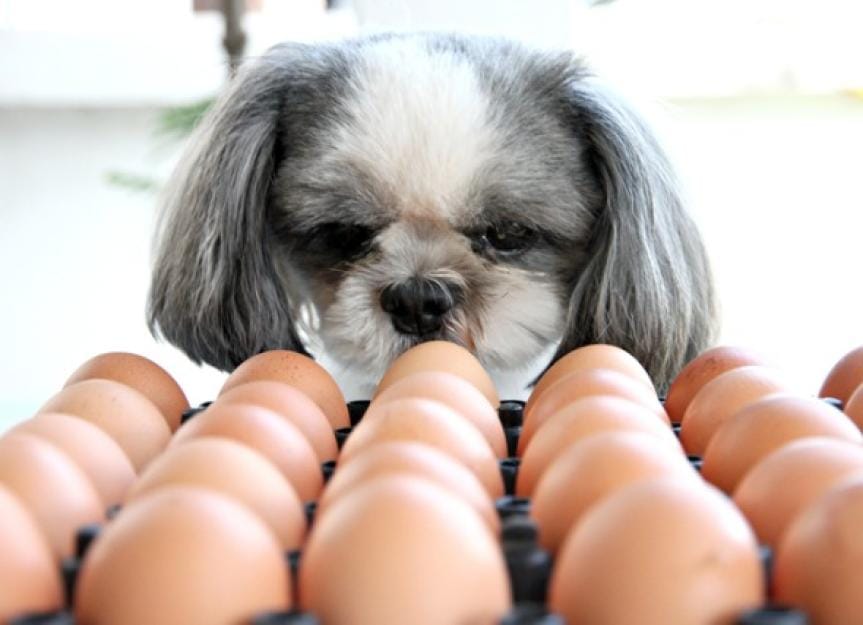Wondering if your Maltese furry friend can enjoy eggs as part of their diet? In this article, we will explore whether Maltese dogs can eat eggs and the potential benefits and risks associated with this popular human food.

Nutritional Benefits of Eggs for Maltese Dogs
Eggs are a great source of protein, and they contain essential vitamins and minerals, such as vitamin A, vitamin D, and iron. Protein is essential for your Maltese's overall health, as it helps build and repair tissues, produce enzymes and hormones, and support a strong immune system. The vitamins and minerals found in eggs contribute to your dog's overall well-being, promoting healthy skin, coat, and bones.
However, it is essential to understand that every dog is different, and what may be suitable for one breed may not be suitable for another. Before adding eggs to your Maltese's diet, it is crucial to consult with your veterinarian. They can assess your dog's specific dietary needs and advise you on the appropriate portion sizes. Additionally, they can help determine if your Maltese has any food allergies or sensitivities that should be taken into consideration.
Risks and Precautions of Feeding Eggs to Maltese Dogs
While eggs can be a healthy addition to your Maltese's diet, it is vital to avoid adding any seasonings or additives that could be harmful to their health. Some seasonings, such as salt and onion powder, can be toxic to dogs. It is best to offer plain, cooked eggs to your Maltese without any additional ingredients.

Raw eggs should be avoided due to the risk of salmonella. Raw eggs can harbor harmful bacteria that can lead to food poisoning in dogs. It is important to cook eggs thoroughly before feeding them to your Maltese. This will eliminate any potential bacteria and ensure the eggs are safe for consumption.
How to Introduce Eggs into a Maltese Dog's Diet
When introducing eggs into your Maltese's diet, it is important to start slowly and monitor their reaction. Begin by offering a small piece of cooked egg as a treat and observe how they respond. If your Maltese shows no signs of discomfort or digestive issues, you can gradually increase the portion size.
It is recommended to incorporate eggs into your Maltese's regular meals rather than as a standalone treat. This will ensure they receive a balanced diet and not overload on eggs alone. Remember to consult with your veterinarian to determine the appropriate amount of eggs to include in your dog's diet based on their specific needs.
Cooking Methods for Feeding Eggs to Maltese Dogs
There are various cooking methods you can use to prepare eggs for your Maltese. The most common methods include boiling, scrambling, or poaching. Boiled eggs are a convenient option as they can be prepared in advance and stored in the refrigerator for a quick and easy snack. Scrambled eggs can be cooked with minimal oil or butter, ensuring a healthy and tasty treat for your Maltese.
It is important to avoid using any seasonings or additives when cooking eggs for your Maltese. Stick to plain, unseasoned eggs to avoid any potential harm to your dog's health.
Portion Control for Feeding Eggs to Maltese Dogs
Feeding your Maltese dog eggs can be a nutritious addition to their diet, but it's essential to exercise portion control to maintain a balanced and healthy feeding routine. Here's a guide to help you navigate the right amount of eggs for your petite furry friend.
1. Size Matters:
- Consider Your Maltese's Size: Maltese dogs are small in stature, and their portion sizes should reflect that. Adjust the egg portion based on your Maltese's weight, aiming for an appropriate balance in their overall diet.
2. Frequency Guidelines:
- Moderation is Key: While eggs offer valuable nutrients, they should be treated as an occasional treat rather than a daily staple. Aim for no more than two to three times a week, ensuring other components of their diet are equally diverse.
3. Egg Preparation:
- Cooked Eggs Only: Always serve eggs to your Maltese in a cooked form. Scrambled or boiled eggs are excellent choices. Avoid adding any seasonings, spices, or oils during preparation.
4. Monitoring for Allergies:
- Observe for Reactions: Introduce eggs gradually into your Maltese's diet and monitor for any signs of allergies or sensitivities. Common indicators include digestive issues, skin reactions, or changes in behavior.
5. Adding Eggshells:
- Calcium Supplementation: If you choose to add crushed eggshells for extra calcium, do so sparingly. Consult with your veterinarian to determine the appropriate amount, as excessive calcium intake can lead to health issues.
6. Consult with Your Veterinarian:
- Personalized Guidance: Every Maltese dog is unique, and their nutritional needs may vary. Consult with your veterinarian to receive personalized advice on portion sizes and frequency based on your dog's age, weight, and health condition.
7. Balancing the Overall Diet:
Incorporate Variety: While eggs provide essential nutrients, ensure that your Maltese's overall diet is well-balanced. Include a mix of high-quality dog food, lean meats, vegetables, and fruits suitable for dogs.
8. Observe Weight and Body Condition:
- Maintain a Healthy Weight: Regularly monitor your Maltese's weight and body condition. Adjust the egg portion if you observe any changes in weight to prevent overfeeding.
Adhering to portion control guidelines ensures that your Maltese receives the nutritional benefits of eggs without disrupting their overall dietary balance. Always prioritize your dog's health, and when in doubt, consult with your veterinarian for tailored advice.
Signs of Egg Allergies in Maltese Dogs

Egg allergies in Maltese dogs, though uncommon, can manifest in various ways. It's essential for pet owners to be vigilant and recognize potential signs of allergies to ensure the well-being of their furry companions.
1. Digestive Issues:
- Vomiting and Diarrhea: Persistent vomiting or diarrhea after consuming eggs may indicate an allergic reaction. Monitor your Maltese closely for these symptoms.
2. Skin Reactions:
- Itching and Redness: Allergic reactions can manifest on the skin. If you observe your Maltese excessively scratching, redness, or skin irritation, it could be a sign of an egg allergy.
3. Respiratory Distress:
- Coughing or Wheezing: In some cases, egg allergies may affect the respiratory system, leading to coughing or wheezing. If your Maltese exhibits unusual breathing patterns after consuming eggs, consult your veterinarian.
4. Swelling:
- Facial Swelling: Allergic reactions can cause facial swelling, particularly around the eyes, muzzle, or mouth. Immediate veterinary attention is necessary if you notice any swelling.
5. Lethargy and Discomfort:
- Unusual Behavior: Allergies can make your Maltese feel lethargic or uncomfortable. If you observe any sudden changes in behavior after egg consumption, it's essential to investigate further.
6. Gastrointestinal Distress:
- Abdominal Pain or Discomfort: Allergic reactions can sometimes cause abdominal pain or discomfort. Monitor your Maltese for signs of distress, such as whining or restlessness.
7. Changes in Bowel Movements:
- Constipation or Straining: Allergies may lead to changes in bowel habits. If you notice constipation or straining during bowel movements, it could be related to an allergic reaction.
8. Excessive Salivation:
- Drooling: Excessive salivation, beyond what is typical for your Maltese, may be a sign of an allergic response. Keep an eye out for changes in drooling patterns.
If you suspect your Maltese may have an egg allergy based on these signs, it's crucial to consult with a veterinarian promptly. Professional guidance will help determine the best course of action, including potential changes to your dog's diet and appropriate medical interventions.
Other Human Foods that Maltese Dogs Can Safely Eat
While eggs can be a healthy addition to your Maltese's diet, there are other human foods that can be incorporated as well. Some safe options include lean meats, such as chicken and turkey, cooked vegetables like carrots and green beans, and fruits like apples and bananas. However, it is crucial to research and consult with your veterinarian before introducing any new human food into your Maltese's diet.
Consult with a Veterinarian Before Introducing Eggs to a Maltese Dog's Diet
Before making any changes to your Maltese's diet, it is always best to consult with your veterinarian. They have the knowledge and expertise to guide you in providing a balanced and nutritious diet for your furry friend. Your veterinarian can assess your Maltese's individual needs, including any potential allergies or sensitivities, and provide tailored recommendations.

Maltese Dogs and Egg Food Facts
Maltese dogs, with their small size and elegant white coats, make wonderful companions. As a responsible pet owner, understanding the relationship between Maltese dogs and egg consumption is crucial for their overall well-being. Let's explore some essential facts about feeding eggs to Maltese dogs.
1. Protein Powerhouse:
- High-Quality Protein: Eggs are a fantastic source of high-quality protein, which is essential for the growth and maintenance of a Maltese dog's lean muscle mass.
2. Nutrient-Rich Goodness:
- Vitamins and Minerals: Eggs contain a range of vitamins and minerals beneficial for Maltese dogs, including vitamin A, vitamin D, and various B vitamins. These nutrients contribute to overall health and vitality.
3. Healthy Coat Maintenance:
- Biotin Content: Eggs are rich in biotin, a B-vitamin known for promoting a healthy coat. Including eggs in your Maltese's diet can contribute to maintaining their signature silky and lustrous fur.
4. Moderation is Key:
- Balanced Diet: While eggs offer numerous benefits, it's crucial to incorporate them into your Maltese's diet in moderation. Excessive egg consumption may lead to an imbalance in their overall diet.
5. Cooked Eggs for Safety:
- Safe Preparation: Always serve eggs to your Maltese in a cooked form. Raw eggs may pose a risk of salmonella, and cooking ensures the elimination of potential pathogens.
6. Allergy Awareness:
- Individual Responses: Just like humans, dogs can have individual allergies. While rare, some Maltese dogs may be allergic to eggs. Introduce eggs gradually and monitor for any adverse reactions.
7. Eggshells for Calcium:
- Calcium Boost: Finely crushed eggshells can be added to your Maltese's diet to provide an extra calcium boost. Consult your veterinarian to ensure proper supplementation.
8. Consult with Your Veterinarian:
- Individualized Advice: Every Maltese dog is unique. Before making significant changes to your pet's diet, consult with your veterinarian. They can provide personalized advice based on your Maltese's specific needs.
Understanding the role of eggs in your Maltese dog's diet empowers you to make informed decisions about their nutrition. With proper care and attention to their dietary requirements, you can contribute to your Maltese's health and happiness.

Conclusion: Eggs as a Healthy and Occasional Treat for Maltese Dogs
In conclusion, eggs can be a healthy addition to your Maltese's diet when prepared and served correctly. They are a great source of protein and contain essential vitamins and minerals that contribute to your dog's overall well-being. However, it is crucial to consult with your veterinarian before introducing eggs or any new food into your Maltese's diet. They can provide personalized guidance based on your Maltese's specific needs, ensuring a balanced and nutritious diet. Remember, moderation and portion control are key when offering eggs or any treat to your furry friend.
Frequently Asked Questions (FAQs):
- Q1: Can eggs replace regular dog food?
- While eggs offer valuable nutrients, they should not replace your Maltese dog's regular food entirely. It's essential to maintain a balanced diet that meets all their nutritional needs.
- Q2: Are there any egg-related health risks?
- While eggs are generally safe, some dogs may have allergies or sensitivities. Introduce eggs gradually and monitor your Maltese for any adverse reactions, such as itching, vomiting, or diarrhea.
- Q3: How often should eggs be included in a Maltese's diet?
- Moderation is key. Incorporate eggs into your Maltese's diet as an occasional treat, not a daily staple. Consult with your veterinarian to determine a suitable frequency based on your dog's individual needs.
- Q4: Can eggshells be given to Maltese dogs?
- Yes, finely crushed eggshells can provide additional calcium. However, it's crucial to introduce them cautiously and monitor your dog's response. Consult with your veterinarian to ensure the right balance of nutrients.
- Q5: What other foods complement an egg-based diet for Maltese?
- A well-rounded diet includes a variety of foods. Complement an egg-based diet with high-quality dog food, lean meats, vegetables, and fruits suitable for dogs. Ensure all foods are safe and tailored to your Maltese's specific requirements.